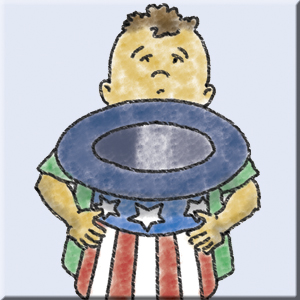The nation's most vulnerable children are getting the short end of the spending stick.
Spending more and getting less: sound familiar?
A recent assessment of the well-being of children in the industrialized world offers some parallels and correlations between the state of the nation's wheezing health care system and the prognosis for its youngest and most vulnerable members: children.
The Organization of Economic Cooperation and Development (OECD), a Paris-based research and policymaking body, trained its wonky eyes on the kids coming of age within its 30 member states, which include most of Western Europe, the United States, Canada, Mexico, and Japan.
Its researchers found some things to be alarmed about, particularly in the United States. Overall, the nation is performing rather poorly in the care and feeding of its next generation of workers and consumers compared to its peer group. U.S. children are less healthy than their counterparts; their education is shakier. This poor showing occurs despite the fact that the United States, at $140,000 a tousled head, spends slightly more than the OECD average of $125,000 on children under 18.
According to the report: "In spite of the United States being a very high-income country, in key outcomes of health, education, and poverty, U.S. children do less well than their peers in other, less rich countries. Infant mortality (fourth worst in the OECD after Mexico, Turkey, and the Slovak Republic) and child mortality (fifth worst in the OECD) are higher than the OECD average. So, too, are rates of low birth weight (sixth worst in the OECD)."
Not unlike our health care system, we may not be getting the greatest bang for our many bucks in terms of spending on children.
The study suggests that the poor showing in the United States on overall child welfare is at least partly driven by an alarming epidemic of teen parenthood. The rate of teen births in the United States is three times the OECD average, beaten only by Mexico among OECD member nations.
But another major driver of poor performance is our skewed funding priorities. Too much is spent in the United States on older kids between 12 and 18 and not enough on kids when they are very young-infant to 6. Smart-dollar investments in preventative health, education, and general well-being can provide dramatic payoffs later in life, according to the study. In fact U.S. spending on kids under 6 lags far behind other countries, amounting to only $20,000 per child, $10,000 below the OECD average.
"A better balance of spending between the Dora the Explorer years of early childhood and the teenage Facebook years would help improve the health, education, and well-being of all children in the long term," the OECD said.
That imbalance is partly attributable to America's over-the-top spending on health care. That big sucking sound you hear is health care draining resources that could be better spent on a gamut of other social needs related to childhood well-being.
If President Obama needs to find a more convincing justification to devise a tighter grip on America's spiraling health care costs-now on a path to consume 25 percent of the nation's GDP if reform cannot restrain its voracious appetite-he might want to hold up a forlorn-looking toddler the next time Glenn Beck goes into rhetorical hyperdrive.
Last July Pope Benedict XVI reminded the industrialized world at a G8 summit that despite the global economic downturn they were still morally required to invest in the human person by supporting the most vulnerable in the developing world. That same requirement holds for an indeed wise investment in the most vulnerable within our own communities.
The OECD study concludes that the United States should spend more on young children and teenagers among critically disadvantaged communities to improve poor child health, poor basic education, and high rates of child poverty.
"Despite the United States' strong research and policy tradition in the area of child well-being, too many American children are still left behind," says the OECD's Simon Challpe, co-author of the report. That's where our family-values culture has long claimed we adults wouldn't leave them.
This article appeared in the November 2009 issue of U.S. Catholic (Vol. 74, No. 11, page 46).














Add comment